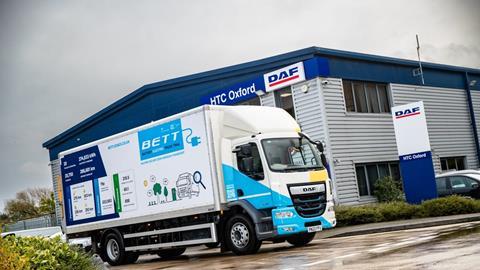DAF Trucks has published the key conclusions to its £10m Battery Electric Truck Trial (BETT), which ran from April 2022 to October 2023.
Funded by Innovate UK under the SBRI ZE Road Freight Competition, the trial saw NHS Supply Chain and local authorities test 20 DAF LF Electric 19t Rigids.
A final report into the trial is now imminent but DAF said initial feedback from drivers had been largely positive despite lingering concerns over range and reliability.
A little under 58GB of raw data was downloaded during the trial with just over 16 billion data points recorded from nearly 21,000 journeys covering 287,000 km.
The BETT vehicles used 275,000kW of electric, enough to boil 2.75 million litres of water. The truck has a range of up to 175 miles on each battery charge, and can be rapid charged at 150 kW for quick turn-around between shifts.
The data was compiled by low emission vehicle research specialist Cenex which found a drive cycle energy saving of 25% in urban areas but for motorway driving this was down to just 5%.
The test found the battery is more than half full for 80% of the time when the vehicle starts to charge and almost never finishes less than half full.
The efficiency of the on-board charger for 22kW fast charging is consistently around 90%.
The research confirmed that the vehicle gave operators the opportunity to save money if they had a charging facility in the depot.
As a business case the truck stacks up, they concluded, with a 19p running cost saving per km. This amounted to fuel cost savings across the trial of £53,983.
Drivers rated acceleration from standing, rolling acceleration, environmental performance and overall drive comfort ‘much better’ than diesel equivalents.
Ease and safety of refuelling, manoeuvrability, braking and ability to handle steep inclines were also rated as ‘better’ in the electric version of the vehicle.
Only the vehicle range on a full tank of fuel or full charge was rated ‘much worse’ with another question mark over whether the new technology made the truck less reliable.
“Electric trucks go like a rocket, attract attention and are great for marketing,” said one driver, while another explained that the reduced noise of the vehicle meant deliveries were now possible out of hours.
However, the research also uncovered some drawbacks: “The cab was hard to keep warm and negatively affected range,” said one driver, while another said he was “only let down by the charger”.
Aside from the reduced range of the vehicle, another driver criticised the battery indicator which he said made it hard to see how much charge was remaining.
Technical issues also took longer to resolve, the trial found, due to a lack of suitably trained mechanics.

















